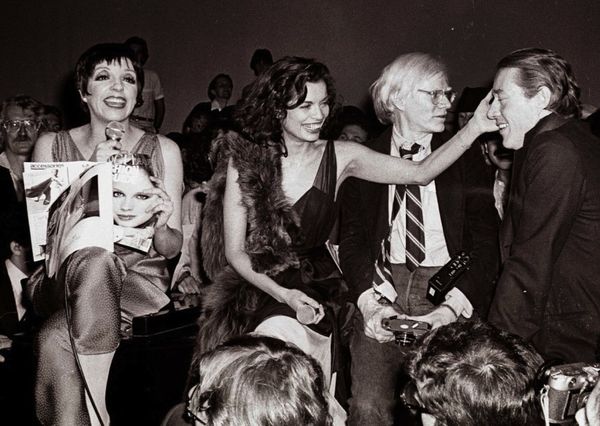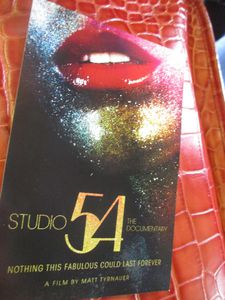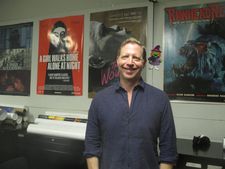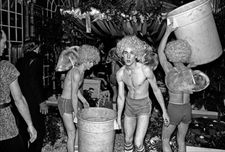 |
| Liza Minnelli, Bianca Jagger, Andy Warhol, and Halston at Studio 54: "The rest of the world sees it as a triumph and a golden age of something that was a kind of paradise lost." |
Matt Tyrnauer, the director of Valentino: The Last Emperor, Scotty And The Secret History Of Hollywood, and Citizen Jane: Battle For The City (a 2016 DOC NYC highlight and the opening night selection) joined me for a conversation on his latest documentary Studio 54. I came down from Lincoln Center, following the 56th New York Film Festival morning screening for High Life and press conference with Claire Denis and Robert Pattinson to meet him at the offices of Kino Lorber.
Anthony Haden-Guest, author of The Last Days Of Disco (not Whit Stillman's film), is seen commenting on the crowd outside of Studio 54: "It's like the damned looking into paradise." Ian Schrager "the Greta Garbo of nightclubs", Truman Capote asleep in the middle of a disco, Bianca Jagger and Gloria Swanson hanging out together 27 years after Sunset Boulevard, and how Steve Rubell and Schrager's "ambition to create the ultimate nightclub and change the world" came up as we discussed the layers of the history of the infamous New York venue.
No other nightclub casts such a long, impenetrable shadow as Studio 54. Who was there and what happened and how fabulous it all was has entered the realm of legend. Matt Tyrnauer's clear-headed, and because of that, even more fascinating look behind the scenes does not indulge in the gossip parade about the good old days. Studio 54 existed for a mere 33 months between 1978 and 1980 in the space of a former theater and CBS television studio on a seedy stretch of 54th street on the West Side of Manhattan.
Anne-Katrin Titze: I just rushed downtown from the New York Film Festival press conference for Claire Denis' High Life, so I'll be transitioning from outer space to Studio 54, two very different worlds.
Matt Tyrnauer: Of course.
AKT: I like how you begin your interview with Ian Schrager. He asks "I just go?" You are not hiding that this is a documentary and that he is talking to you.
MT: I like that beginning with him. It shows that he was unsure and a little even perhaps nervous. And he's someone who is very successful and, I think, is an intimidating person to a lot of people. And this immediately shows that you get a little access to him that you have never had.
I've been calling him just today the Greta Garbo of nightclubs because he never spoke about Studio 54, which is really the foundation of this film. The film as it exists couldn't exist without Ian Schrager because he is telling his story for the first time. It's really the premise of the documentary.
AKT: It's the question being asked: Why talk about it now? After so many years?
MT: For Ian? I think there's a reason to talk about Studio 54 now. But it would have been difficult to get made without Ian.
AKT: So what's the order of things? He said, now is the time to talk about it? You were pushing?
MT: No, it's 40 years basically, more or less since Studio. He was reticent to speak because it was for him almost uniquely a shameful experience. The rest of the world sees it as a triumph and a golden age of something that was a kind of paradise lost.
Ian, having created it, lost it, lived it, went to prison - which is not anything to take lightly. I think a lot of people forgot about that passage. However for me that was in a way the most interesting part because it makes it a rise and fall story but it also makes it a rise, fall, and rise again story.
And you're getting it from the kind of over-the-shoulder perspective of Schrager who was the surviving co-founder [with Steve Rubell]. His reticence to talk was cured in a way by his adult daughters who found out about Studio 54 through the internet of all things. And thought it was actually really cool whereas Ian had almost tried to hide it from them, absurdly.
I think his seeing it through their eyes helped him come to terms with the fact that he had created something immortal. It's part of his legacy and a part of it that might even be bigger than Ian himself.
AKT: It's fascinating to see the difference in memories. How people see things when they are involved often very differently than people who only know the hype, who know the story from the outside. There were moments with Scotty Bowers [Scotty and the Secret History of Hollywood] as well, where I thought you were also uncovering some layers of differing memories of times past.
MT: Oh I agree. Thank you. I think both films are in a way - well Scotty is certainly an alternate history. Thoroughly. This is a film that could be called definitive, just because Ian is speaking. I think definitive is a kind of tricky word, but it has the air of definitiveness about it perhaps. And it gives an alternate take on most people's take on something world-famous. Sex, drugs, and disco is the Studio 54 byword, basically. For me, the story upon examination was very different than that.
It was really an examination of a particular time in the late 20th century that includes the explosive, volcanic, last gasp of a sexual revolution and the transition of a permissive and free-spirited society into a much more conservative and tragic era, which is defined by the HIV AIDS crisis and a political shift that is symbolised by the rise of Reagan. The world changed entirely and it seems there were a confluence of historical events that were in a way conspiring.
AKT: That's well put.
 |
| Claire Denis with Robert Pattinson at the New York Film Festival press conference for High Life Photo: Anne-Katrin Titze |
MT: It seems like there was a really mischievous dark-minded hand of God manipulating our world at that time when the Seventies hit a brick wall. And whatever freedom people had discovered with their sexuality and the way they conducted their lives was altered forever.
AKT: "Create the ultimate nightclub - change the world," is a quote from your film.
MT: I think they did do that. The movies I make, I attempt to work on many different levels. I think that this is also a story of ambition and it's the story of a marriage. And it's a story of creativity and partnership.
Their ambition to create the ultimate nightclub and change the world is a particular narrative of two guys from Brooklyn, one gay, one straight, who had a dream and improbably fulfilled that dream. That in itself I think is symbolic of the shift in society where the old establishment was on its last breaths and the upstarts from Brooklyn could actually make a difference.
AKT: It's absolutely fascinating to see the combination of people at Studio 54, hanging out next to each other. There's Truman Capote between Gloria Swanson and Bianca Jagger!
 |
| Studio 54 opens at the IFC Center in New York on October 5 Photo: Anne-Katrin Titze |
MT: That's wonderful, yes exactly.
AKT: You have this combination of people who all have their aura, their world and then they come together in this one place where it's like a fire burning for a short time, or the dance on the volcano.
MT: Yes, dance on a volcano is a very nice metaphor. I love that picture of Truman Capote asleep in the middle of a disco! With his hat pushed over his face. And your discerning eye identified Bianca Jagger and Gloria Swanson. Most people wouldn't recognise Gloria Swanson but that just shows you that Studio 54 was actually much closer in years to Sunset Boulevard than it is to our present moment.
AKT: It's chilling in a way. I never thought about it until you just said it.
MT: It was 27 years after Sunset Boulevard. Now we're 40 years away from it. It's a movie also about a seismic shift in our culture that happened at that time.
At the IFC Center in New York: Friday, October 5 following the 7:45pm screening, Matt Tyrnauer and Ian Schrager will participate in a Q&A; Saturday, October 6 following the 5:25pm and 7:45pm screenings, Matt Tyrnauer will participate in Q&As
Studio 54 opens in the US on October 5
























